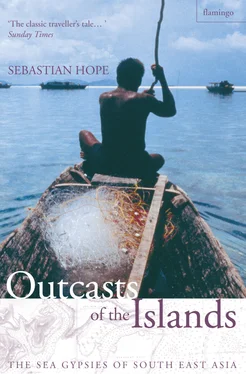1 ...6 7 8 10 11 12 ...18 The sun was already hot and its strength was redoubled by the glare from the water. I retreated to the shade of the awning, only too aware after a night on the boards of the sunburn I had suffered the previous day. I could not go fishing. I watched from the boat as Sarani poled away in the dug-out over the bright shallows until his figure, standing in the bow of the canoe, became a silhouette at the edge of the reef against the empty eastern horizon.
The fleet had reassembled around us and in this social hour of the morning canoes plied between the boats, paying calls, returning a borrowed bowl, bringing food, others heading for the fishing grounds on the falling tide, collecting a pole or a paddle or a parang. We had our fair share of curious visitors. I listened without understanding to the lilting cadences of the language that seemed at odds with Minehanga’s sharp voice, listening for something that sounded familiar. I wondered how the two of us would get on without a common language. She spoke no Malay; I would have to learn Sama. This was my first time alone with her and I had no idea what she thought about my presence in her home. As helpless as one of her children and with a smaller Sama vocabulary than even Arjan, I had invaded her nest like an outsized cuckoo chick, an uninvited mouth to feed. She talked loudly and slowly at me, showing her buck teeth, and I felt like a Spanish waiter being mauled by a British tourist. I struggled to pick out something that I understood. Melikan was a word that had come up again and again in her conversations with the visitors. Now she was saying it and pointing at me. Half of it sounded familiar; ikan is the Malay word for ‘fish’. Was I expected to go fishing as well? It began to dawn on me that Melikan referred to what I was rather than what I was supposed to do, that it was a corruption of ‘American’ and meant ‘Westerner’ in general. And so I was named. She would say ‘ Melikan ,’ and point to a sarong near where I sat and I would pass it, or ‘ Melikan ,’ miming striking a match and I would proffer my lighter. We rubbed along.
Sumping Lasa was still scared of me. I only had to look at her and smile to send her running to her mother’s side. Mangsi Raya cried the moment she was more than a yard away from Minehanga. Arjan was more bold. He would run up to me, shout and run away chuckling, making the boards jump in his wake. Minehanga told him to stop, but he did not and on his next sortie he bumped into Sumping Lasa. She landed hard on her backside and started to cry. Arjan got a cuff round the ear and joined in. After the first few gusts of tears Sumping Lasa got up and went over to Minehanga for attention. She stood next to her mother, her hands cupped behind her ears, her mouth open wide and silent as her convulsed face began to redden. The silence was agonising, her face a mask of pure grief. It went on. Her mouth opened wider. And then the full force of the tantrum struck. She let out an awesome bellow, almost as long as the silence, followed by another and another. She had her mother’s voice. When it became obvious that Minehanga was not interested, she started hitting Mangsi Raya, who was startled by the surprise attack and began to cry as well. Whereupon Sumping Lasa got a clip round the head and doubled her efforts. Mangsi Raya stopped crying the moment the nipple touched her lips. Arjan knew he had won and dried his eyes. He started running up and down the boat again, his upper lip glistening with snot, taking care to avoid Sumping Lasa as she drifted around in a blur of tears, slapping my foot each time he passed. Sumping Lasa started drumming on the boards with both feet, running on the spot until she fell over. In the midst of the mayhem I caught Minehanga’s eye and we smiled.
‘ Kurang ikan ,’ was all Sarani had to say about his fishing, ‘but today there is no one playing bombs. Maybe they thought the wind would be strong, like last night. You were scared, no?’ He laughed at the memory. ‘It is not the season for strong wind. In this season, the wind comes from there’ – he pointed north – ‘and in the other season it comes from there’ – the south – ‘and that is when there are strong winds. Normally in this season we stay on the other side of Mabul and on this side of Kapalai.’ I was keen to find out their range, to find out just what sort of a ride I could expect. ‘We fish here and at Mabul. Then there is one reef past Mabul, Padalai, just a reef, no island. We go there sometimes. There is one more reef towards Danawan, called Puasan. The Bajau Laut from Danawan also fish there. After that? The season of the south wind comes in two months more [ dua bulan , literally ‘two moons’]. We stay here for a time after that, maybe one moon, and then we go to the islands near Sandakan to catch shark. When the season changes we come back here.’ It seemed extraordinary to me that Sarani could tell me exactly how his year was spent, exactly when the south wind would come, and yet not be able to say how old he was. I asked him how old Arjan was, thinking he would be able to remember how many times he had been to Sandakan since his birth, but he did not know that either. It was almost as though there was some taboo surrounding age that prevented him from saying if he knew, or maybe from even reckoning age at all. I could not understand it. Living so close to the Equator and its perpetual equinox means that the length of days and nights does not vary much year round. The words ‘summer’ and ‘winter’ do not have a useful meaning. But the Bajau Laut live in a world full of other time signals, just as regular, just as significant. There are two tides a day, a full moon every twenty-eighth night, and a change in the prevailing wind every six months. These events are so central to the pattern of their life that it seemed inconceivable to me they would not tally them.
But then why bother counting? When the tide falls you prop up the boat. When the moon is full you go fishing at night. When the wind changes you move your anchorage. You do not have to plan beyond the next tide and the next visit to the well; there is no need to lay in store for winter, as there is no winter. There is no need to know how old you are. When you are big enough you learn to swim and paddle a canoe. When you are strong enough you help with the fishing and the housework. When you reach puberty you work and wear clothes. When the bride price has been raised you are married. While your strength lasts you are parent and provider. When your strength fails you do what you can to help. These are the only markers of time that make any sense, the events of a personal history, and there is no need to count them as they happen only once. I would ask Sarani when things happened and he would say, ‘I was already wearing shorts,’ or ‘Before my first wife died,’ or ‘While I was still strong,’ or ‘When the coconut palms were so high,’ or ‘Before Kapalai was washed away.’ These were the singular events against which his time was measured.
The heat had gone out of the afternoon and Minehanga had been busy while we were talking. She had cooked up the dolen Sarani had gathered – the téhé-téhé had been given away. A steaming dish was brought out to the bow, the motive claw of each mollusc projecting now that it had been boiled, and forming a dainty handle by which to pull it from the conical shell. They tasted like whelks. ‘ Kahanga are better, but we save them for market.’ The empties went back into the water, waiting for squatters; eventually the dead shells would rise up and walk away on the legs of hermit crabs.
Pilar came back from the reef and began to sort out his deepwater net. We went with him when he set out to the south-east to lay it off the Ligitan Reef. We talked more after a supper of boiled fish, sitting out on the foredeck in the darkness before the moon rose. The boat bobbed in the light breeze. Arjan came out to join us, sitting in the crook of his father’s legs and banging on the Tupperware betel box. Minehanga was singing Mangsi to sleep, a lullaby sung in her raucous voice above the soft noises of water and air, but it was strangely soothing in the glow of the oil lamp.
Читать дальше












